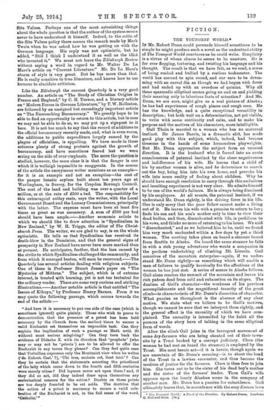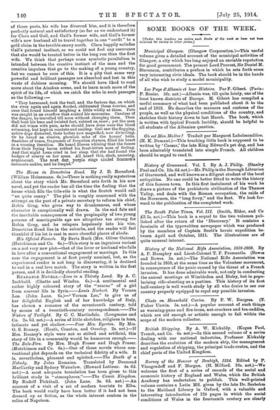FICTION.
THE YOUNGEST WORLD.*
Ig Mr. Robert Dunn could persuade himself sometimes to be simple be might produce such a novel as the undoubted ability of The Youngest World convinces us he could write. Simplicity is a virtue of whose charm he seems to be unaware. He is for ever flogging, torturing, and twisting his language and his thought. The result is that we have felt, as we read, a sense of being rushed and bullied by a restless taskmaster. The world has seemed to spin round, and our ears to be drum- ming with an unreal din as though we had begun with fever and had ended up with an overdose of quinine. Why all these spasmodic elliptical scenes going on and on and yielding their meaning only to laborious feats of attention ? And Mr. Dunn, we are sure, might give us a real picture of Alaska; be has had experiences of rough places and rough men. He has the knowledge, and a quite exceptional versatility in description; but both wait on a determination, not yet visible, to write with some continuity and calm, and to make his purpose and the motives of his characters, more intelligible.
Gail Thain is married to a woman who has no maternal instinct. Sir James Barrie, in a dramatic skit, has made good play with this subject, which, indeed, had become tiresome in the hands of some humourless playwrights. But Mr. Dunn approaches the subject from an unusual direction. It is the husband who is forced into an acute consciousness of paternal instinct by the sheer negativeness and indifference of his wife. He learns that a child of his by another woman is alive, and he determines to search out the boy, bring him into his own home, and provoke his wife into some reality of feeling about children. Why he should have enough resolution to carry through this audacious and insulting experiment is not very clear. He admits himself to be one of the world's failures. He is always being dismissed by his employers. At all events, the paternal instinct, if we understand Mr. Dunn rightly, is the driving force in his life. One is only sorry that the poor fellow cannot make a living out of it. He leaves his wife with a promise to return to her ; finds his son and his son's mother only in time to view their dead bodies, and then, disenchanted with life, is perfidious to his vows, and thinks no more of returning to his home. We said "disenchanted," and so we believed hint to be, until we found him very much enchanted within a few days by yet a third woman. The meeting takes place on board a steamer bound from Seattle to Alaska. On board the same steamer he falls in with a rich young adventurer who wants a companion in the perilous undertaking of climbing Mt. Lincoln. Gail conceives of the mountain enterprise—again, if we under- stand Mr. Dunn rightly—as something which will enable a man of failures to qualify heroically for the affections of the woman he has just met. A series of scenes in Alaska follows. Gail alone reaches the summit of the mountain and leaves his rich patron dead from cold and exhaustion on its slopes. The dualism of Gail's character—the weakness of his previous accomplishments and the magnificent tenacity of the great climb—is characteristic of Mr. Dunn's dissection of character. What puzzles us throughout is the absence of any clear motive. We state what we believe to be Gail's motives, though we cannot be sure that we interpret them rightly, and the general effect is the unreality of which we have com- plained. The unreality is intensified by the habit all the persons of the story have of talking in the same elliptical form of words.
After the climb Gail joins in the insurgent movement of some dry-farmers who are being cheated out of their town- site by a Trust backed by a corrupt judiciary. Clara (the woman he had met on board the steamer) is employed by the Trust. His next heroic act—if it is heroic, though again we are uncertain of Mr. Dunn's meaning—is to shoot the head of the Trust in a lawless encounter, and thus become the medium of justice for the farmers. Clare is then free to join him. She turns out to be the sister of his dead boy's mother and the sister of the farmers' leader. Then Gail's wife appears upon the lonely Alaskan scene in the company of another man. Mr. Dunn has a passion for coincidence. Gail ultimately learns that, in accordance with the easy divorce laws
• The Youngest World : a Note/ of the Frontier. By notert Du.nn. LGuclon G. Bell and Sons. [Gs.]
of those parts, his wife has divorced him, and it is therefore perfectly natural and satisfactory (so far as we understand it) for Clara and Gail, and Gail's former wife, and Gail's former wife's new husband all to travel together in one "outfit" to a gold claim in the terrible snowy north. Clara happily satisfies Gail's paternal instinct, or we could not feel any assurance that she would be treated better in the long run than the first wife. We think that perhaps some symbolic parallelism is intended between the creative instinct of the man and the creative impulses that go to the making of a young country, but we cannot be sure of this. It is a pity that some very powerful and brilliant passages are absorbed and lost in this waste of dubious meaning. We should have liked to read more about the Alaskan scene, and to learn much more of the spirit of its life, of which we catch the echo in such passages as the following :— "They harnessed, took the trail, and the furious day, on which the river again and again flooded, obliterated these worries, and once Gail found himself laughing a little wildly at them. Pete was caught in an overflow that soaked his moccasins. Careless of the danger, he travelled till noon without changing them. Then Gail beat his bare and twisted feet, rubbed on snow; yet the man did not wince with pain, as he should have done were the blood returning, but kept on resolute and smiling. Gail saw the flagging, active dogs distorted, their bodies now magnified, now dwindling. Or he heard an elusive, ghoulish echo of the horses' bells. Snatches of tunes, fragments of forgotten rhymes, filled his heart in a wearing iteration. He heard Bleven whining that the fumes from their frying bacon robbed his frost-bitten nose of feeling. And that night Lena cried in her sleep that she had found the badges of scurvy on her arms. All heard this, slack, uncaring, acquiescent: The next day, purple rings circled Scannon's insensate ankles, and he limped."







































 Previous page
Previous page